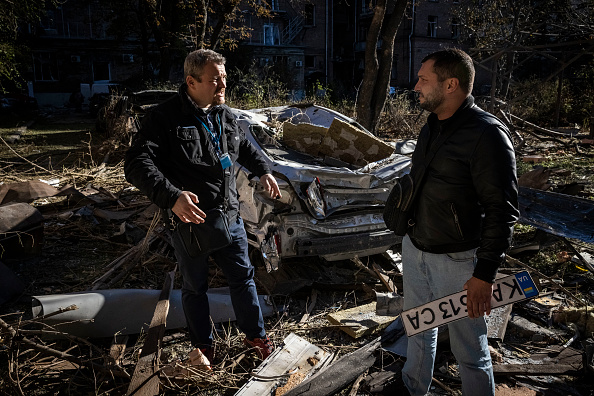In Ukraine, the Middle East is starting to take sides and it could tip the scales

Historically, the Gulf states have maintained a delicate balance in international conflicts outside of the Middle East and North Africa. This is a formula they adhered to when the Russia-Ukraine conflict broke out in February; keen to remain neutral, Saudi Arabia and the UAE were determined to be passive observers.
But that may be changing.
It seems the Gulf states, and their rival Iran, have covertly crept their way into the Russian and Ukraine conflict. With Iran supplying arms and surveillance technology to Russia, and the Saudi Crown Prince, Mohammed Bin Salman (MBS) mediating a monumental prisoner swap alongside Turkey – the Middle East seems to be trying their hand.
That isn’t to say that Ukraine is yet another proxy battleground for Middle Eastern powers. Last week, Russia and Saudi Arabia agreed to limit OPEC+ oil production by about two million barrels a day.
This move stunned the Kingdom’s Western allies, with US officials branding it “a total disappointment,” even “hostile”.
This is quite a departure from the quintessentially non-confrontational approach the Gulf states normally adopt in Western wars.
And a recent move by Zelensky indicates there is far more to play than just diplomatic wins. There are – indeed – opportunities that could determine the outcome of this conflict.
Last week, President Zelensky appeared on Saudi Arabia’s Arab News Frankly Speaking show. This rather unorthodox approach to wartime communications was partly due to Saudi Arabia’s significant role in mediating a 300-person prisoner swap last month – which Zelensky was quick to praise.
However, Zelensky’s television appearance came shortly after reports Russia had used Iranian made drones, indicating enhanced military and strategic cooperation between the two countries, an undoubtedly deeply concerning development for the Gulf.
Zelensky even went on the record to offer “wonderful terms and conditions” to Arab investors in exchange for Gulf investment in Ukraine’s $350bn reconstruction and development efforts.
And it does make sense. Sanctions on Russia, and a global recession inching ever closer, have given Saudi and the Gulf states leverage in the global oil supply chain – enriching the kingdoms, even leading to record profits for Aramco.
As a result, they are perfectly situated to provide economic assistance to Ukraine’s daunting rebuilding efforts. A prospect Saudi Arabia, the UAE, and Bahrain will likely take seriously, as they attempt to wean their economies and capital off oil.
If the last decade is any indication, Russia is capable of formidable impact on Middle Eastern politics. For example, Russia handed Syria back to Bashar Al-Assad when defeat seemed imminent – much to the Gulf’s ire.
There was also the price war between OPEC and Russia in 2020 that forced oil prices below zero. Not to mention the substantial Russian investment being directed to the Gulf, particularly the UAE – its top investment destination in the region.
It’s no surprise the Gulf currently sees more value in cooperation over confrontation. The latter has rarely yielded desirable results. The question, however, remains. Will a Russian-Arab partnership produce long-term results?
While there are some short-term gains for the Gulf, any long-term alignment would come at a high cost.
As the war drags on, with no end in sight, there will certainly be a revaluation by the West of the Gulf states’ position on Ukraine.
It’s worth remembering that, for the West, this is not about politics. It fundamentally views the conflict as one that defines worldview and order, and their allies’ positions determine which side of that they will fall on. And the Saudis will undoubtedly find few friends in a Russian bloc which includes Iran.
Moscow would likely take note of Saudi Arabia’s own potential economic and geopolitical clout – demoting Russia in 2019 to become China’s primary supplier of oil. The two nations have since competed heavily for the top spot, with Saudi retaining its position.
The reality is an economically battered Russia is in no position to offer much to the Gulf nations. If anything, as a net exporter, Russia is leaning heavily on the Gulf states in its time of economic need. And although Russia still has its trump card in Europe – through the continents’ heavy reliance on Russian gas supplies – the same is simply not true in the Middle East.
For now, the Gulf may maintain the balance they have struck. But for how long they, and Moscow, can keep their interests aligned in what is an unequal and economically skewed relationship, is a question which could change the geopolitical landscape.
